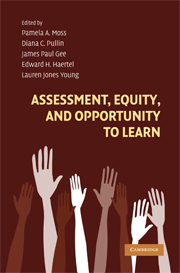Book contents
- Frontmatter
- Contents
- Preface
- List of Contributors
- ASSESSMENT, EQUITY, AND OPPORTUNITY TO LEARN
- 1 Introduction
- 2 Assessment Through the Lens of “Opportunity to Learn”
- 3 A Sociological Perspective on Opportunity to Learn and Assessment
- 4 A Sociocultural Perspective on Opportunity to Learn
- 5 Individualizing Assessment and Opportunity to Learn
- 6 Cultural Modeling as Opportunity to Learn
- 7 Opportunities to Learn in Practice and Identity
- 8 Game-Like Learning
- 9 Sociocultural Implications for Assessment I
- 10 Issues of Structure and Issues of Scale in Assessment from a Situative/Sociocultural Perspective
- 11 Sociocultural Implications for Assessment II
- 12 Assessment, Equity, and Opportunity to Learn
- Index
- References
4 - A Sociocultural Perspective on Opportunity to Learn
Published online by Cambridge University Press: 05 June 2012
- Frontmatter
- Contents
- Preface
- List of Contributors
- ASSESSMENT, EQUITY, AND OPPORTUNITY TO LEARN
- 1 Introduction
- 2 Assessment Through the Lens of “Opportunity to Learn”
- 3 A Sociological Perspective on Opportunity to Learn and Assessment
- 4 A Sociocultural Perspective on Opportunity to Learn
- 5 Individualizing Assessment and Opportunity to Learn
- 6 Cultural Modeling as Opportunity to Learn
- 7 Opportunities to Learn in Practice and Identity
- 8 Game-Like Learning
- 9 Sociocultural Implications for Assessment I
- 10 Issues of Structure and Issues of Scale in Assessment from a Situative/Sociocultural Perspective
- 11 Sociocultural Implications for Assessment II
- 12 Assessment, Equity, and Opportunity to Learn
- Index
- References
Summary
INTRODUCTION
The field of psychometrics has been predominant in work on testing and assessment. For the most part, psychometrics has been strongly influenced by traditional psychological assumptions about the mind and learning. Work that takes a sociocultural perspective has played a much smaller role and has heretofore made little contact with psychometrics. This chapter discusses contributions such a sociocultural perspective has to make to issues of assessment and testing, with a focus on an expanded notion of opportunity to learn (OTL). Ensuring that all learners have had equal OTL is both an ethical prerequisite for fair assessment and a solid basis on which to think about educational reforms that will ensure that all children can succeed at school. It is also a point at which mutually informing discussion can occur between people working in psychometrics and those working on sociocultural approaches to learning.
This section begins with a consideration of the traditional perspective in psychology, one that views knowledge and learning through the lens of mental representations in individuals' heads (Clancey 1997). Even in this traditional view, many of the types of issues that sociocultural perspectives emphasize also arise, although in a more backgrounded way. I will then turn to a more direct consideration of sociocultural perspectives, starting with the relationship between learners and their learning environments. In subsequent sections, I will spell out this relationship in terms of the connections between learning and learners' experiences in the world; how knowledge is distributed across people and their tools; the central importance of people's participation in shared talk and social practices; and the nature of the special varieties of language used in talk and participation when people learn in content areas in school – areas like math, science, social studies, and literature.
- Type
- Chapter
- Information
- Assessment, Equity, and Opportunity to Learn , pp. 76 - 108Publisher: Cambridge University PressPrint publication year: 2008
References
- 110
- Cited by

